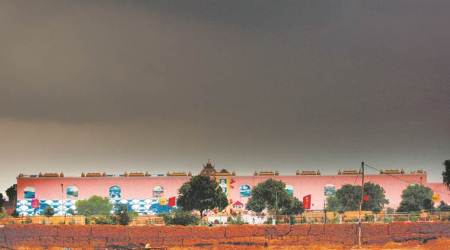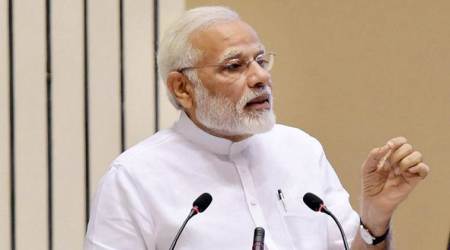 Chiranjeet and Aanchal at a children’s home.
Chiranjeet and Aanchal at a children’s home.
Spotting a PVC pipe lying in a corner of the room, the 12-year-old jumps to his feet to fetch it. “Utha ke dekhiye, itna mota danda se koi maarega to kya hoga (Just lift this and see. If someone is beaten with such a thick stick, will they survive)?” he says. And yet, Chiranjeet Chowdhary believes, his mother could have lived, had she not been weak from a surgery a year earlier. He too bears the wounds of that day, when a mob hit him and lynched his mother Gorakhpati Devi, in Radha Nagar village of Jharkhand’s Sahibganj district, with PVC pipes, accusing her of being part of a gang of “choti-katwa (braid choppers)”. The incident happened on August 19, when rumours of hair being cut were swirling across north India.
The attack happened on the premises of a new primary health centre; the pipes lay around as construction had just got over. The news got out because someone in the thousand-plus-strong crowd made a video. It shows Chiranjeet sitting in a corner, bleeding, his T-shirt torn, watching his mother being beaten. At the children’s home in Sahibganj where Chiranjeet and his five-year-old sister, Aanchal, were brought two days later, the 12-year-old says he suffers from nightmares, often waking up with a start in the middle of the night.
Aanchal had to be moved to the home too as there is no one to look after the two. Their father died three years ago, and the children lived with their mother on the streets. They belong to a nomadic community that collects honey from hives, and are often hired by people to do so. They survive either on the money made from selling the honey or on alms. Gorakhpati and her children had spent the past few years in Bihar and West Bengal, apart from Jharkhand, but recently settled down near Radha Nagar with a relative, Nageshwar Chowdhary. At least seven of them shared a hutment there.
Following the incident, Jharkhand Chief Minister Raghubar Das announced that the state would bear the burden of bringing up Chiranjeet and Aanchal. The in-charge of the children’s home, Amit Ranjan, says they have “a huge responsibility”. “Chiranjeet has been finding it very difficult to adjust to the new setting. He is used to life on the streets, just getting up and moving, making some money. I spotted him once trying to slip out of the premises through the window grill. I now ensure that everything is kept locked.” Nageshwar, with whom Gorakhpati and her children had been living, was with them on the day of the attack. Nageshwar says he, his wife, Gorakhpati and Chiranjeet were out begging when some people started shouting they were “braid cutters”. “I tried to show them my Aadhaar card. Some people even recognised me, saying I was a beggar,” Nageshwar says. But the crowd did not relent.
 PHC building where Chiranjeet and Aanchal’s mother was killed.
PHC building where Chiranjeet and Aanchal’s mother was killed.
Nageshwar says they were dragged into the PHC building, and that he and his wife, with the help of some workers there, managed to lock themselves in a room. But Gorakhpati and Chiranjeet got left out. “We could see them being beaten up. By then the crowd had grown, to the first floor of the building. They pelted stones, damaging the window panes. Police arrived, but couldn’t enter as they were attacked too. Finally, police opened fire in the air. The crowd wanted to catch hold of all of them… Koi sunane-samajhne ko taiyyar nahin tha (No one was willing to listen to anything)… just like animals,” recalls Kangan Kumar, the construction supervisor at the PHC, with a shiver.
Kumar adds that the labourers who witnessed the incident later fled, and he is having trouble getting the work completed.
Sub-Divisional Police Officer (Raj Mahal) Sunil Kumar says several of his men were injured in stone-pelting, and that they fired nearly 25 rounds in the air to disperse the mob. Four persons, including a woman, are under arrest, while 17 others named in the FIR are absconding. One of those arrested is Mala Devi of village Meer Nagar, located opposite Radha Nagar, from whose house rumours of braid-chopping spread. The other three, Chhakku Mandal, Govind Mandal and Asraul Sheikh, are also residents of the same village.
Meer Nagar is now virtually deserted. While the video indicates a thousand-plus mob was present during the attack on Gorakhpati, no one here admits to seeing it. Most say they were in the fields; all others claim they were “bed-ridden”.
That includes PDS shop dealer Govind Mandal, who says he had been ill for five days when the incident happened. “From what I hear, Raja Mandal of the village claimed his daughter’s hair had been chopped off. Just then some people caught hold of these beggars and beat them up.”
Raja, whose mother Mala Devi is under arrest, runs a tent and music business, and isn’t much liked in the area. “We kept our distance from him,” Ramdas Mandal says. Villagers now say they doubt his claim of his daughter’s hair being cut. “I hear just a small piece of hair in the front was cut. It could have been done for style too,” says Ramdas, who adds he didn’t see the lynching.
Govind Mandal claims to be himself surprised at the size of the crowd, and insists they were “outsiders”. “Not many villagers use WhatsApp etc. But we had been hearing about choti-katwa from TV. We knew these were all rumours. I don’t know how so many people gathered, they were clearly from nearby villages.”
Govind points out that the rumours of braid-chopping stopped abruptly after August 19. “Don’t you find that strange? If we believed in superstition, these should have continued.” Officials at the children’s home say that after being brought in, Chiranjeet initially wouldn’t talk or eat anything. While he is calmer now, Chiranjeet keeps talking about leaving. After the CM took up their case, Chiranjeet and Aanchal’s elder brother as well as step-siblings have come and met them at the home. Chiranjeet’s father had another wife, and four children from her. Chiranjeet hangs on to the promise by his elder brother, who works as a labourer in Kolkata. “He told me he will take me out soon, and only on the condition that I go to school.”
The state government has promised to take care of Chiranjeet and Aanchal’s education. Chiranjeet says he went to school when he was very young, but stopped after about a fortnight.
The District Child Protection Officer, Poonam Kumari, says the authorities would check all aspects before taking a call on Chiranjeet and Aanchal’s future. “We would like the children to get special care and go to school. But the boy is restless. We are apprehensive as he may go back to his old lifestyle. Finally, the higher-ups would decide,” she says. Sitting in a bare room that he shares with elder inmates besides Aanchal, Chiranjeet keeps repeating the same thing. Once, twice, many times. “Humko ghar bhej deejiye, humko ghar jaana hai. Hum wahaan school mein padhenge. Hum ee sab kaam ab nahin karenge (Send me home, I want to go home. I will study there in a school. I won’t beg now).”

